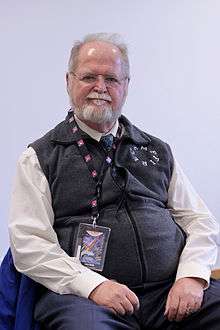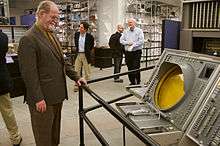Laurence van Cott Niven (born 30 April 1938) is an American science fiction author, most famous as the author of Ringworld (1970), his "Known Space" stories, and Niven's laws.
Quotes

Anything you don't understand is dangerous until you do understand it.

Everything starts as somebody's daydream.

The dinosaurs became extinct because they didn't have a space program. And if we become extinct because we don't have a space program, it'll serve us right!

The Unexpected always comes at the most awkward times.
- There’s always another problem behind the one you just solved. Does that mean that you should stop solving problems?
- Flash Crowd, section 7, in Three Trips in Time and Space (1973), edited by Robert Silverberg, p. 65
- For each human being there is an optimum ratio between change and stasis. Too little change, he grows bored. Too little stability, he panics and loses his ability to adapt.
- Flash Crowd, section 9, in Three Trips in Time and Space (1973), edited by Robert Silverberg, p. 74
- Drugs: “There’s no way to keep them from getting in. Anyone who wants drugs can get them. We make arrests where we can, and so what? Me, I’m betting on Darwin.”
“How do you mean?”
“The next generation won’t use drugs because they’ll be descended from people who had better sense.”- Flash Crowd, section 9, in Three Trips in Time and Space (1973), edited by Robert Silverberg, p. 77
- That's the thing about people who think they hate computers … What they really hate are lousy programmers.
- Oath of Fealty (1982) (co-written with Jerry Pournelle)
- Think of it as evolution in action.
- Oath of Fealty (1982) (co-written with Jerry Pournelle)
- God was knocking, and he wanted in bad.
- Describing the sound inside a spacecraft propelled by nuclear explosions, in Footfall (1986)
- Half of wisdom is learning what to unlearn.
- The Ringworld Throne (1996)
- Everything starts as somebody's daydream.
- As quoted in Reader's Digest Quotable Quotes : Wit and Wisdom for All Occasions from America's Most Popular Magazine (1997) by Reader's Digest Association, p. 27
- The dinosaurs became extinct because they didn't have a space program. And if we become extinct because we don't have a space program, it'll serve us right!
- The Unexpected always comes at the most awkward times.
- Scatterbrain (2003), p. 26
Short fiction
Neutron Star (1968)
- Page numbers from the mass market edition, published by the Ballantine Books; ISBN 0-345-27065-7 eighth U.S. printing, March 1978
- See Larry Niven's Internet Science Fiction Database page for original publication details
- Part of being a coward is wanting security.
- A Relic of the Empire (p. 37)
- Do you know what it’s like to be suddenly poor and not know how to live poor?
- A Relic of the Empire (p. 43)
- There is no turning away from knowledge.
- The Soft Weapon (p. 123)
- “Do you believe in hunches?”
“No.”
“Neither do I. Except just this once.”- Flatlander (p. 159)
- The moral of this story is, anything you don’t understand is dangerous until you do understand it.
- Flatlander (p. 164)
- “Does it help you to know that you’ve ruined my day?”
“It does, yes.”- The Handicapped (p. 220)
- I didn’t want to find her. Not now. Our bargain had been clear, and also inevitable; and there are advantages to sleeping alone. I’ll think of them in a moment.
- Grendel (p. 237)
- Just take my word for it, will you? Assume I’m a genius.
- Grendel (p. 248)
- Was he deadpan because he didn’t care anymore? How much boredom can you meet in three hundred years?
- Grendel (p. 251)
- Any time seems long when you need to make a decision but can’t.
- Grendel (p. 252)
A Hole in Space (1974)
- Page numbers from the mass market edition, published by the Ballantine Books; ISBN 0-345-29225-1 sixth printing, March 1980
- See Larry Niven's Internet Science Fiction Database page for original publication details
- “Do you like strange places and faraway people—or vice versa?”
“Both.”- Rammer (p. 4)
- The trouble with sharing too many beds was that one’s chance of running into a really bad situation was improved almost to certainty.
- A Kind of Murder (p. 66)
- Presently she gave her considered opinion. “Idiots.”
“No. They’re just like all of us: They want something for nothing.”- All the Bridges Rusting (p. 88)
- I had to grin. Morris was shocked and horrified. I’d shown him a brand new sin.
- The Fourth Profession (p. 164)
- A species that can’t develop spaceflight is no better than animals.
- The Fourth Profession (p. 167)
- When you trade among the stars, there is no repeat business.
- The Fourth Profession (p. 176)
Tales of Known Space (1975)
- Page numbers from the mass market edition, published by the Ballantine Books; ISBN 0-345-25836-3 third printing, November 1976
- See Larry Niven's Internet Science Fiction Database page for original publication details
- The morning was blacker than the inside of a smoker’s lungs.
- Becalmed in Hell (p. 16)
- There was this about him: he knew who I was, but he hadn’t remembered my name. Ron Cole had better things to think about than what name belonged with whom. A name was only a tag and a conversational gambit.
- Cloak of Anarchy (p. 115)
- I asked him, “Do you know the difference between nude and naked?”
He shook his head.
“Nude is artistic. Naked is defenseless.”- Cloak of Anarchy (p. 124)
- Anyone who says human nature can’t be changed is out of his head. To make it stick, he’s got to define human nature—and he can’t.
- The Warriors (p. 142)
- Peace isn’t a stable condition, not for us. Maybe not for anything that lives.
- The Warriors (p. 151)
- “That’s impossible. Isn’t it? Carlos?”
Carlos’ mouth twisted. “Not if it’s being done.”- The Borderland of Sol (p. 160)
- In a universe the size of ours almost anything that can happen, will.
- There Is a Tide (p. 201)
- “Do you play games of chance?”
“Emphatically yes. The process of living is a game of chance. To avoid chance is insanity.”- There Is a Tide (p. 206)
- Gambling was safer than war. More fun, too. Best of all, it gave him better odds.
- There Is a Tide (p. 208)
Convergent Series (1979)
- Page numbers from the mass market first edition, published by the Ballantine Books; ISBN 0-345-27740-6 March 1979
- See Larry Niven's Internet Science Fiction Database page for original publication details
- I’d thought my way into this mess. I should be able to think my way out, shouldn’t I?
- Convergent Series (p. 103)
- A sufficiently intelligent being will look about her, solve all questions, then cease activity.
- The Schumann Computer (p. 145)
- Ten thousand years wasn't enough...no lifetime was enough, unless you lived it in such a way as to make it enough.
- Cautionary Tales (p. 181)
- Time is a one-way street with no parking spaces. You just have to keep going.
- Wrong Way Street (p. 214)
World of Ptavvs (1966)
- Page numbers from the Del Rey mass market paperback
- A machine has no mind to read; you never know when it’s going to betray you—
- p. 6
- It does not destroy matter, which is reassuring. Rewriting one law of physics is worse than trying to eat one peanut.
- p. 40
- A thrint was master over every intelligent beast. This was the Powergiver’s primal decree, made before he made the stars. So said all of the twelve thrintun religions, though they fought insanely over other matters.
- p. 85
- Putting a monkey wrench in machinery is often the only way to force somebody to repair, replace, or redesign the machinery. Especially legal or social machinery.
- p. 97
A Gift From Earth (1968)

The bleeding-heart symbol does not represent any known revolutionary organization. … Yes, the bleeding heart was something else again. … A signature.
He was sick of having to be afraid. … If he stopped being afraid, even for an instant, he could be killed!
- A ramrobot had been the first to see Mount Lookitthat. Ramrobots had been first visitors to all the settled worlds. The interstellar ramscoop robots, with an unrestricted fuel supply culled from interstellar hydrogen, could travel between stars at speeds approaching that of light.
- First lines, Ch. 1 : The Ramrobot
- Matthew Leiah Keller sat beneath a watershed tree and brooded. Other children played all around him, but they ignored Matt. So did two teachers on monitor duty. People usually ignored Matt when he wanted to be alone.
Uncle Matt was gone. Gone to a fate so horrible that the adults wouldn't even talk about it.- Ch. 1 : The Ramrobot
- The medical revolution that began with the beginning of the twentieth century had warped all human society for five hundred years. America had adjusted to Eli Whitney's cotton gin in less than half that time. As with the gin, the effects would never quite die out. But already society was swinging back to what had once been normal. Slowly; but there was motion. In Brazil a small but growing, alliance agitated for the removal of the death penalty for habitual traffic offenders. They would be opposed, but they would win.
- Ch. 1 : The Ramrobot
- From the beginning there had been a revolutionary group. Its name had changed several times, and Matt had no idea what it was now. He had never known a revolutionary. He had no particular desire to be one. They accomplished nothing, except to fill the Hospital's organ banks. How could they, when the crew controlled every weapon and every watt of power on Mount Lookitthat? If this was a nest of rebels, then they had worked out a good cover. Many of the merrymakers had no hearing aids, and these seemed to be the ones who didn't know anyone here. Like Matt himself. In the midst of a reasonably genuine open-house brawl, certain people listened to voices only they could hear.
- Ch. 2 : The Sons Of Earth
- "You look like a girl with a secret," Matt said. "I think it must be the smile."
She moved closer to him, which was very close, and lowered her voice. "Can you keep a secret?"
Matt smiled with one side of his mouth to show that he knew what was coming. She said it anyway. "So can I."- Ch. 2 : The Sons Of Earth
- The organ banks would be supplied for years. Not only would the crew have a full supply, which they always did anyway, but there would be spare parts for exceptional servants of the regime; i.e., for civil servants such as Jesus Pietro and his men. Even the colonists would benefit. It was not at all unusual for the Hospital to treat a sick but deserving colonist if the medical supplies were sufficient. The Hospital treated everyone they could. It reminded the colonists that the crew ruled in their name and had their interests at heart. And the Sons of Earth was dead. All but one man, and from his picture he wasn't old enough to be dangerous. Nonetheless Jesus Pietro had his picture tacked to the Hospital bulletin boards and sent a copy to the newscast station with the warning that he was wanted for questioning. It was not until dawn, when he was settling down to sleep, that he remembered who belonged to that face. Matthew Keller's nephew...
- Ch. 3 : The Car
- Any citizen, with the help of the organ banks, can live as long as it takes his central nervous system to wear out. This can be a very long time if his circulatory system is kept functioning. … But the citizen, cannot take more out of the organ banks than goes into them. He must do his utmost to see that they are supplied. … The only feasible method of supplying the organ banks is through execution of criminals. … A criminal's pirated body can save a dozen lives. There is now no valid argument against capital punishment for any given crime; for all such argument seeks to prove that killing a man does society no good.
Hence the citizen, who wants to live as long and as healthily as possible, will vote any crime into a capital crime if the organ banks are short of material. … Cite Earth's capital punishment for false advertising, income tax evasion, air pollution, having children without a license.
The wonder was that it had taken so long to pass these laws.- Millard Parlette's notes, in Ch. 7 : The Bleeding Heart
- There were organ banks all over the world, inadequately supplied by people kind enough to will their bodies to medical science.
How useful is the body of a man who dies of old age? How fast can you reach a car accident? And in 2043, Arkansas, which had never rescinded the death penalty, made the organ banks the official state method of execution.
The idea had spread like wildfire .... like a moral plague, as one critic of the time had put it.- Ch. 7 : The Bleeding Heart
- Jesus Pietro wasn't used to dealing with ghosts.
It would require brand new techniques.
Grimly he set out to evolve them.- Ch. 8 : Polly's Eyes
- Jesus Pietro was worried. The Sons of Earth, if they got this far, would go straight to the vivarium to free their compatriots. But if Matthew Keller was his own agent... If the ghost of Alpha Plateau was not a rebel, but a thing with its own unpredictable purpose...
Jesus Pietro worried.- Ch. 10 : Parlette's Hand
- "I'm no historian," said Harry. "But morals are morals. What's unethical here and now is unethical anywhere, anytime."
"Kane, you're wrong. It is ethical to execute a man for theft?"
"Of course."
"Did you know that there was once a vastly detailed science of rehabilitation for criminals? It was a branch of psychology, naturally, but it was by far the largest such branch. By the middle of century twenty-one, nearly two-thirds of all criminals could eventually be released as cured."
"That's silly. Why go to all that trouble when the organ banks must have been crying for — Oh. I see. No organ banks."- Ch. 10 : Parlette's Hand
- Parlette spoke slowly and evenly. "I am trying to prevent a bloodbath. Is that clear enough for you? I'm trying to prevent a civil war that could kill half the people in this world."
- Ch. 10 : Parlette's Hand
- Someone or something was in this room, something or someone with the power to make people forget. … He was reaching for the stunner on his desk when something caught his eye. It was the dossier for Matthew Keller, senior. A crude drawing defaced its yellow cover.
Two open arcs, joined, in black ink. Three small closed loops beneath.
The bleeding heart. It certainly hadn't been there before.
Jesus Pietro opened the folder. He could smell his own fear, and feel it, in the cool perspiration that soaked his shirt. As if he'd been afraid for hours.- Ch. 11 : Interview with the Head
- The bleeding-heart symbol does not represent any known revolutionary organization. … Yes, the bleeding heart was something else again. A gruesome symbol on a vivarium floor. Fingers that broke without their owner noticing. An ink drawing appearing from nowhere on a dossier cover, like a signature. A signature.
- Ch. 12 : The Slowboat
- He was sick of having to be afraid. It was a situation to drive a man right out of his skull. If he stopped being afraid, even for an instant, he could be killed! But now, at least for the moment, he could stop listening for footsteps, stop trying to look in all directions at once. A sonic stunner was a surer bet than a hypothetical, undependable psi power. It was real, cold and hard in his hand.
- Ch. 12 : The Slowboat
- I have a kind of psychic invisibility. As long as I can stay scared, I can keep people from seeing me. That's what we have to count on.
- Matt to Polly in Ch. 12 : The Slowboat
- Millard Parlette was near exhaustion. … Sometimes it seemed to him, that he was at the end of his life, that he'd waited just long enough to meet this — the crisis he'd foreseen a hundred years ago. … Known rebels moved freely through the Hospital, and no one could touch them. Their attitude toward the police was rude and contemptuous. Rumor had it that Millard Parlette was drafting new laws to further restrict police power. It didn't help that the rumors were true.
- Ch. 14 : Balance Of Power
Ringworld (1970)
- Page numbers from the Del Rey mass market paperback
- Louis knew a few xenophobes, and regarded them as dolts.
- p. 9
- The perversity of the universe tends towards a maximum. The universe is hostile.
- p. 142
- One mark of a good officer, he remembered, was the ability to make quick decisions. If they happen to be right, so much the better.
- p. 152
- The majority is always sane.
- p. 177
The Mote in God's Eye (1974)
- Co-written with Jerry Pournelle
- Page numbers from the mass market paperback edition published by Pocket Books ISBN 0-671-74192-6
- Rod privately suspected the Scots studied their speech off duty so they’d be unintelligible to the rest of humanity.
- Chapter 2 “The Passengers” (p. 15)
- Species evolve to meet the environment. An intelligent species changes the environment to suit itself. As soon as a species becomes intelligent, it should stop evolving.
- Chapter 3 “Dinner Party” (p. 31)
- “Perhaps I was expecting too much.”
“Perhaps. We’re all waiting as fast as we can.”- Chapter 13 “Look Around You” (p. 107)
- “It’s a nitwit idea.”
“Yes, sir.”
“Nitwit ideas are for emergencies. You use them when you’ve got nothing else to try. If they work, they go in the Book. Otherwise you follow the Book, which is largely a collection of nitwit ideas that worked.”- Chapter 18 “The Stone Beehive” (p. 157)
- He liked everything about the university except the students.
- Chapter 19 “Channel Two’s Popularity” (p. 162)
- And that’s another reason I don’t want contact between your species and mine. You’re all Crazy Eddies. You think every problem has a solution.
- Chapter 37 “History Lesson” (p. 370; spoken by an alien to an earthman)
- I sometimes wonder why the aristocracy isn’t extinct, the lot of you seem so stupid sometimes.
- Chapter 40 “Farewell” (p. 397)
- As I said, it was inevitable, and I don’t let laws of nature upset me.
- Chapter 47 “Homeward Bound” (p. 445)
- She waited for him to explain a universe in which there was so much injustice.
- Chapter 51 “After the Ball Is Over” (p. 486)
- It had been a long dull evening, with only the thought of leaving the party early to look forward to.
- Chapter 51 “After the Ball Is Over” (p. 491)
- Doctor, you keep asking me to see your point of view, which is based on ethics. You never see mine, which isn’t.
- Chapter 53 “The Djinn” (p. 516; spoken by a politician to a scientist)
A World Out of Time (1976)
All page numbers from the Del Rey mass market paperback ISBN 0-345-25750-2, first Ballantine Books edition, July 1977
- “Can you take orders?”
“I was in the army.”
“What does that mean?”
“Means yes.”- Chapter 1 Rammer, Section 1 (pp. 4-5)
- You’re insane. Imagine my amazement.
- Chapter 2 Don Juan, Section 3 (p. 52)
- He felt good. At worst he had found a brand-new way to die.
- Chapter 2 Don Juan, Section 4 (p. 54)
- He’s a computer. Perfect memory, rigid logic, no judgment. I forgot. I talked to him like a human being, and now—
- Chapter 2 Don Juan, Section 4 (p. 59)
- My self-centeredness is as human as your fanaticism.
- Chapter 4 The Norn, Section 1 (p. 94)
- Too much imagination and I’ll scare myself to death. Too little and I’ll get myself killed.
- Chapter 4 The Norn, Section 1 (p. 95)
- Suddenly Corbell missed Mirabelle terribly. He mourned her, not because she was dead, but because she was gone.
- Chapter 5 Stealing Youth, Section 3 (p. 126)
- War between the sexes had always seemed silly to Corbell. Too much fraternizing with the enemy, ha-ha.
- Chapter 5 Stealing Youth, Section 4 (p. 135)
- Civilization must have become awfully stereotyped before its collapse.
- Chapter 6 The Changelings, Section 1 (p. 144)
The Ringworld Engineers (1980)
- Page numbers from the Del Rey mass market paperback
- We learn only to ask more questions.
- p. 59
- Forget the infinities: Concentrate on detail.
- p. 68
- Sometimes there’s no point in giving up.
- p. 282
N-Space (1989)
- I knew it long ago: I'm a compulsive teacher, but I can't teach. The godawful state of today's education system isn't what's stopping me. I lack at least two of the essential qualifications.
I cannot "suffer fools gladly." The smartest of my pupils would get all my attention, and the rest would have to fend for themselves. And I can't handle being interrupted.
Writing is the answer. Whatever I have to teach, my students will select themselves by buying the book. And nobody interrupts a printed page.- Foreword: Playgrounds for the mind
Destiny's Road (1997)
- Page numbers from the hardcover first edition published by Tor Books ISBN 0-312-85122-7
- Cooking was creation itself; It seemed to put the universe in perspective.
- Chapter 6, “Oven Maker” (p. 69)
- “I copied it.”
“Sure you did, joker, but they drew what they thought you wanted and you copied what you thought you saw—”- Chapter 7, “The Old Surfer” (p. 75)
- Sex was a game nobody lost.
- Chapter 11, “Haunted Bay” (p. 123)
- What’s intelligence for if not for seeking knowledge?
- Chapter 30, “Hydraulic * Empire” (p. 299)
- “It’s a joy,” she said, “watching you keep your mouth shut.”
- Chapter 34, “The Autumn Caravan” (p. 342)
Space.com interview (2000)
- We follow the scientists around and look over their shoulders. They're watching their feet: provable mistakes are bad for them. We're looking as far ahead as we can, and we don't get penalized for mistakes.
- On the relationship between science and science-fiction.
- The wealth of the universe is all over your head. We need to take command of the solar system to gain that wealth, and to escape the sea of paper our government is becoming, and for some decent chance of stopping a Dinosaur Killer asteroid.
- We've fallen way behind. Building one space station for everyone was and is insane: we should have built a dozen.
- Cheap superconductors imply maglev trains everywhere. Computers could get big again, with RAM/ROM rising by powers of forty and fifty, if superconductors shed the heat.
Laser handguns against superconducting armor. I'm not predicting; I just love playing with superconductors.
- Here is where the predictions failed: We didn't take Cargo Cult mentality into account: "if somebody has something I don't, he must have stolen it."
We didn't understand how good we could get at communication — when you have something that someone else doesn't, the whole damn planet knows it.
Niven's Laws
- Original version, and the latest revision, of "how the Universe works" written 29 January 2002, published in Analog Magazine (November 2002)

It is easier to destroy than create.

History never repeats itself.

Stories to end all stories on a given topic, don't.

No technique works if it isn't used.
_Hospital_ship_USNS_Mercy_(T-AH_19)%2C_anchored_off_of_the_coast_of_Jolo_City.jpg)
If what you have to say is important and/or difficult to follow, use the simplest language possible. If the reader doesn't get it then, let it not be your fault.
- 1a) Never throw shit at an armed man.
1b) Never stand next to someone who is throwing shit at an armed man.
- 2) Never fire a laser at a mirror.
- 3) Mother Nature doesn't care if you're having fun.
- 4) Giving up freedom for security has begun to look naive.
Even to me. Many of you were ahead of me on this — Three out of four hijacked airplanes destroyed the World Trade Center and a piece of the Pentagon in 2001. How is it possible that those planes were taken using only five perps armed with knives? It was possible because all those hundreds of passengers had been carefully stripped of every possible weapon. We may want to reconsider this approach. It doesn't work in high schools either.- Earlier version: 4) F x S = k. The product of Freedom and Security is a constant. To gain more freedom of thought and/or action, you must give up some security, and vice versa.
- 6) It is easier to destroy than create.
Bin Laden tore down the World Trade Center? Let's see him build one. If human beings didn't have a strong preference for creation, nothing would get built, ever.
- 7) Any damn fool can predict the past.
- Unsourced variant: Any damned fool can predict the past. And most do.
- 8) History never repeats itself.
- 9) Ethics change with technology.
- 10) Anarchy is the least stable of social structures.
- 11) There is a time and place for tact.
And there are times when tact is entirely misplaced.
- 16) There is no cause so right that one cannot find a fool following it.
To prove a point, one may seek out a foolish Socialist, thirteenth century Liberal, Scientologist, High Frontier advocate, Mensa member, science fiction fan, Jim Bakker acolyte, Christian, witch, or fanatical devotee of Special Interest Lib. It doesn't really reflect on the cause itself. Ad hominem argument saves time, but it's still a fallacy.- Also in Fallen Angels (Baen Books, 1992) as: "Niven's Law: No cause is so noble that it won't attract fuggheads."
- 17) No technique works if it isn't used.
- 19) Think before you make the coward's choice. Old age is not for sissies.
Niven's Laws For Writers
- 1) Writers who write for other writers should write letters.
- 2) Never be embarrased or ashamed about anything you choose to write. (Think of this before you send it to a market)
- 3) Stories to end all stories on a given topic, don't.
- 4) It is a sin to waste the reader's time.
- 5) If you've nothing to say, say it any way you like. Stylistic innovations, contorted story lines or none, exotic or genderless pronouns, internal inconsistencies, the recipe for preparing your lover as a cannibal banquet: feel free. If what you have to say is important and/or difficult to follow, use the simplest language possible. If the reader doesn't get it then, let it not be your fault.
- 6) Everybody talks first draft.
Misattributed
- Any sufficiently advanced magic is indistinguishable from technology.
- Anonymous saying, this is an inversion of the third of Arthur C. Clarke's three laws : "Any sufficiently advanced technology is indistinguishable from magic." It has been attributed to Niven, and even called "Niven's Law" by some, and to Terry Pratchett by others, but without any citation of an original source in either case, and the earliest occurrence yet located is in Keystone Folklore (1984) by the Pennsylvania Folklore Society.
External links
This article is issued from
Wikiquote.
The text is licensed under Creative
Commons - Attribution - Sharealike.
Additional terms may apply for the media files.




